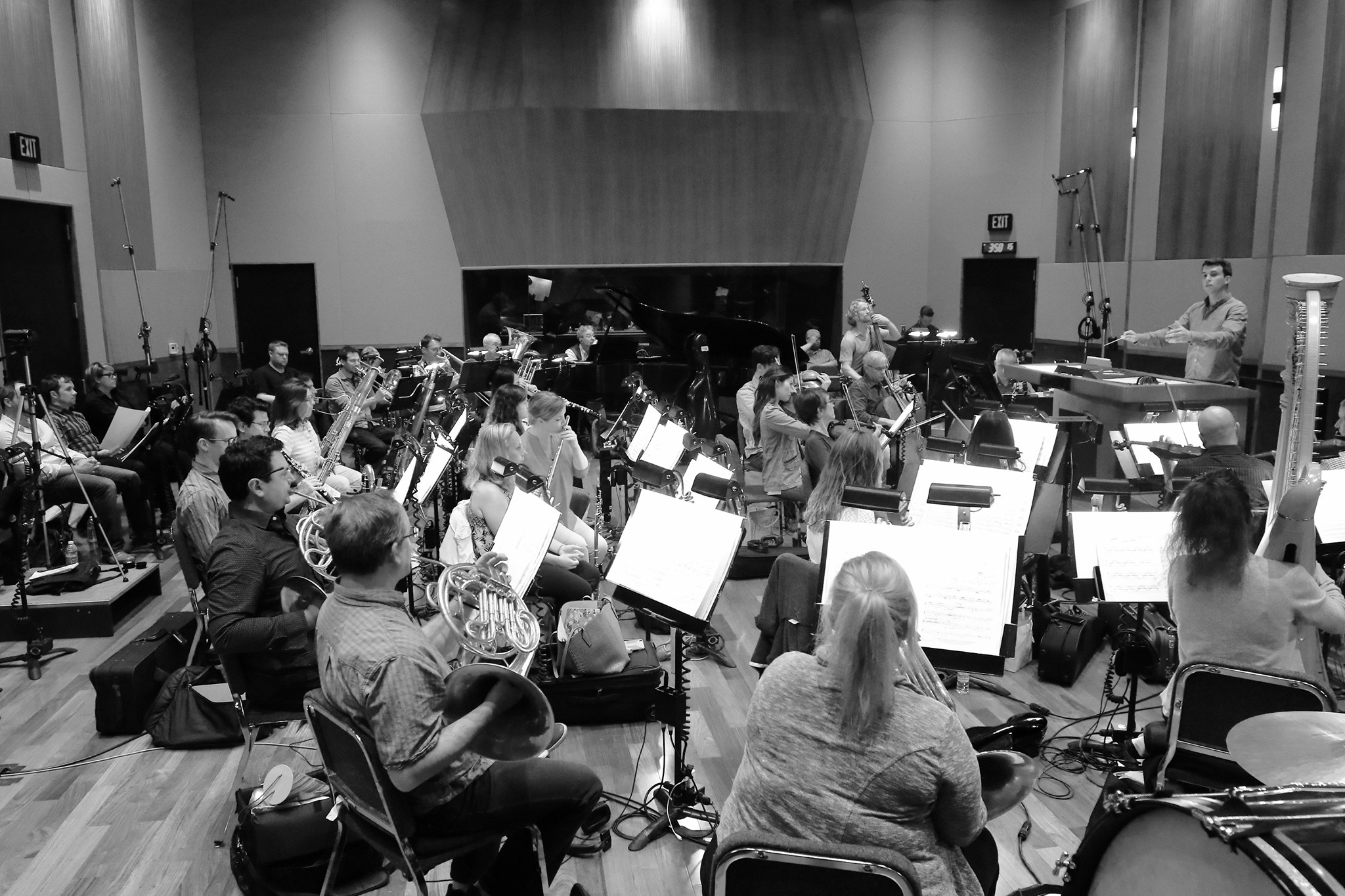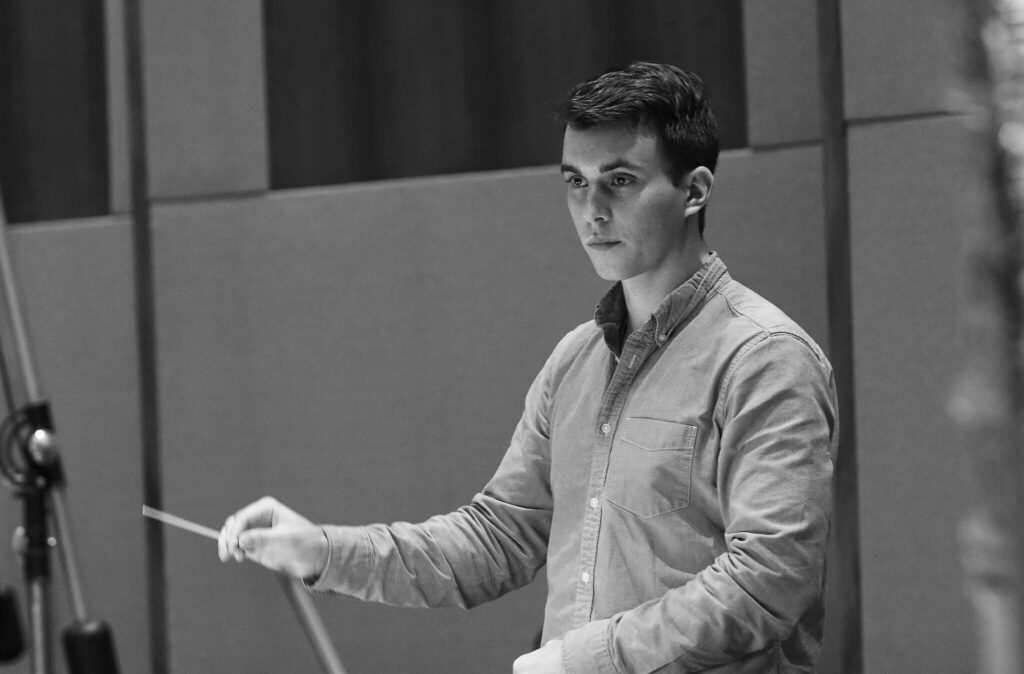Interview by John Wisniewski
AMFM MAGAZINE: when did your interest in music begin, Forrest? Did you study musical
Composition?
AMFM: Any composers who have inspired you?
FORREST GRAY: I’m inspired by so many, it’s hard to choose. But I should just mention John Williams first, for so many reasons. First and foremost, his music introduced me to the practice of scoring for film. The score for Hook was the earliest memory I have of hearing a soundtrack as a distinct component, separate from the film. And even to this day I would attribute so many of my compositional instincts and understanding of orchestration to Williams. While studying at Berklee, I’d check out a new score of his from the library almost every week and pore over it obsessively. Danny Elfman, too. If Hook was the first score that caught my attention as a child, then Elfman’s score for Edward Scissorhands was the first score that inspired me to pursue a career in film scoring. As of late I’ve gotten really into Nicholas Britell. I’ll watch a movie just to hear a Britell score; he’s always changing his palette, and every score is tailor-made for the film, while still containing a certain indelibility. His score for if Beale Street Could Talk is a masterpiece. John Tavener, whose choral music is astonishingly simple, yet sublime. Keith Jarrett, Quincy Jones, and Jacob Collier. And lastly, Alexandre Desplat, and Carter Burwell. Desplat is such an intentional writer, where every idea is so clearly expressed, with a wonderful sense for pacing, and letting the music breathe. Maybe one of my favorite dramatists; the way he interprets a scene is always noteworthy. And with Carter, while I’m admittedly biased, every score of his is so special, boldly intimate, and unique to the film. He has the ability to do so much with so little, such that even a chamber ensemble can feel expansive. His dramatic instincts are phenomenal, too. Fargo is in my top ten, without a doubt. And Bach! I play through the Well-Tempered Clavier every morning, and am still mystified by pieces I’ve played for years. One could spend a lifetime studying his music and only begin to scratch the surface.
AMFM Forrest, your music combines traditional orchestral score, with experimental music. Could you tell us about this?
FORREST GRAY: Yeah, so trying to combine electronic elements with orchestral elements is something that is fairly new to me. Most of my education has centered around orchestral scoring. From Berklee, through USC, and in the workshops I’ve participated in since graduating, I’ve clocked countless hours working with orchestras, and I’m really most comfortable in that setting; what you write on the score is what you hear in the room. But the practice of film scoring has changed significantly, even since I started at Berklee in 2010. It’s rare that you’ll find a score with purely orchestral instrumentation anymore, and that’s great! I mean the sonic boundaries of film music are constantly being pushed, as they should be. Incorporating electronic elements into my scores has posed a new set of challenges, but has proved endlessly rewarding. Once you realize some of the basic principles of traditional orchestration apply to electronic instrumentation, then it’s easier to hybridize the two. And modern film-making really demands these innovations from composers, too, because the aesthetic of film has changed a great deal.
AMFM: What are you working on currently, Forrest?
FORREST GRAY: I’m currently working on an Apple TV animated series of my own. I can’t divulge too much, but so far the process has been really rewarding and I’m excited to start recording sometime next year. I’ll also be composing the score for an independent feature, an Irish noir, starting in early January.
AMFM: Could you tell us about working on “The Morning Show”? What was the concept for this?
FORREST GRAY: I was very lucky to be brought on by Carter Burwell to write additional music for the series. I actually auditioned for the gig by writing a 10-minute suite based off of his themes, and by the time I had access to picture, a lot of the original suite I wrote was conformed to the first few episodes by our terrific music editor, Adam Smalley. Carter really did the lion’s share of the work, and I was there to help out in certain areas. I’m hesitant to speak too much on his behalf, as it relates to the concept of the score, but I know that the sort of guiding philosophy for the music was to play up the irony, playing against the seriousness with which the characters comported themselves in their day-to-day workplace goings-on, while staying more or less out of the way for the genuinely sobering, poignant moments. His use of restraint in the music was so effective in allowing the heartrending moments to stand out. There’s an incredible cue that he wrote for the season one finale that is so heartbreaking, and works so well because, I think, the judicious use of music in the preceding nine episodes allowed for so much sonic space to be taken up in the big, emotional climax of the series. It was such a privilege to have a front-row seat to his process.
AMFM: .Most recently you scored the film “Space Force”. Could you tell us about this?
FORREST GRAY: So this was another project that Carter Burwell brought me on for. As a diehard fan of the Office, getting the opportunity to write Americana orchestral music for a Greg Daniels show, starring Steve Carell no less, was such a thrill. The show follows the Carell character, General Naird, as he leads the haphazard launch of the Space Force program. John Malkovich plays the head scientist of the program, and the chemistry between them really made the series. Their relationship kinda follows the “smart jerk-nice moron” trope, but with a lot more depth, so there were plenty of great moments for score to accentuate their unique relationship. Before I started on the series, Carter had written these wonderful, tuneful themes that lent themselves to variations. It was another great opportunity to just kinda be a fly on the wall and see how a master like Burwell tackles a more traditional, orchestral score.
AMFM: Could you tell us about any upcoming plans and projects, Forrest?
FORREST GRAY: I’m currently the composer on a new animated series for a major streaming service. It’s been an absolute blast, and the cast is phenomenal, too. The show will include original songs and a big band score, which I’ll be recording here in Los Angeles (hopefully!). The timeline for animations are more drawn out generally, so it’ll probably air sometime in the summer, maybe fall. I wish I could say more about it, but that’s all I can divulge right now. I’m also writing on an independent Irish film, which will be released this year, too. I can’t say too much about this project, either, other than the fact that it stars one of my favorite television actors, so It’s been a real treat to write music for. These two projects couldn’t be more different- one an upbeat jazz score, and the other a melancholy, chamber ensemble score, but the balancing of the two in my day to day life has been a wonderful challenge. It can be hard to transition between the two sometimes!


